One of the reasons I’ve always loved summer is that this is the season when nature perfumes the air with breezes that spread the loveliest floral aromas – everything from tropical citrus to sweet honey. All of these aromas have the power to delight the senses and leave a lasting imprint on our memories.
I recently read an interesting article about the science of this which you can read about here but here’s the gist:
The amazing summer scents in the garden are the result of chemical cocktails which are a mixture of many different compounds found in flowers. For an individual flower this cocktail can contain over 100 different compounds.
These enticing chemical cocktails we smell are a mix of volatile organic compounds (VOCs) and low-molecular-weight lipophilic (oil- and fat-soluble) liquids. VOCs include alcohols, aldehydes, ketones, esters and other hydrocarbons. More than 1,700 VOCs have been identified from 90 different plant families.
For all flowers certain compounds tend to dominate and smell especially intoxicating. The Lonicera japonica, a species of the honeysuckle known for its heady, mouthwatering scent, contains over 150 compounds and most prominent is linalool (floral, slightly spicy), jasmone (spicy, fruity, floral) and methyl jasmonate (floral).
How we smell these floral aromas depends on our own chemoreception sensors, i.e. our noses. The ability to smell aromas is genetically determined which is why different people experience these scents so differently. Garden aromas which are practically orgasmic to some may be undetectable to others lacking the right chemical receptors.
The other part which makes smelling garden scents – as well as perfume – so unique is that scent has a natural progression. Any fragrance has a combination of top notes, middle notes and base notes and while top tends to be more fleeting and base the longest lasting there’s a lot of difference in the timing of the progression. I talked about it here when I mentioned the similarities between fragrance and music.
The vastly different ability to smell specific odors is what makes communicating what a scent is so problematic as well. Add to that the fact that all smells are associated with emotions and memories makes this even harder.
Have you ever wondered why you smell certain garden scents in the morning and by evening it’s a totally different bouquet? Believe it or not, plants aren’t releasing their alluring fragrances for human enjoyment! In most cases, plants are communicating with each other or trying to attract pollinators such as insects or birds.
Honeysuckle releases its sweet fragrance and directs butterflies to its prize nectar as the sun sets. Jasmine uses its scent to lure its pollinator (moths) into duty during the evening and nighttime hours when they are active. This is no garden that smells the same during the day through evening and the strongest, most intoxicating scents often emerge as the sun sets. All the more reason to stay outside and drink in the starry night with a glass of wine or cocktail. A glass of rosé while I’m savoring the scent of my roses? Yes please!
This summer I’m especially enjoying my yellow rose bush. Unlike the red roses which emit a traditional rose smell, the yellow flowers have been releasing a fragrance that reminds me of violets with a faint and yummy fruitiness. When the bloom is half-opened it smells most heavenly!
If you’ve read my earlier posts you already know that two of my favorite flowers are jasmine and gardenia. I wasn’t able to plant any jasmine this year sadly but my gardenia has been filling my nose with the most intoxicatingly blissful smells so I can’t complain. Hopeful I’ll be able to keep it alive inside when the colder weather arrives. Gardenias can be finicky and require a lot of humidity to survive indoors. The survival odds aren’t good.
Not to be excluded are my lovely herbs, namely basil and rosemary (pictured below) which I grow alongside my tomatoes, peppers, cucumber and eggplant. Freshly picked basil added on top of sliced tomato and mozzarella cheese is a summer dish staple and is a great side to my grilled lemon rosemary chicken when dining al fresco.
Another aroma that I find absolutely divine is the smell of freshly cut grass. I recently learned that this smell is actually a mixture of oxygenated hydrocarbons called green leaf volatiles. they include methanol, ethanol, acetaldehyde and acetone. And the smell that they produce isn’t just a random byproduct of the cut leaves. Plants react to the damage to their leaves as a signal. Certain plants only emit a specific green leaf volatile when they are grazed by caterpillars. The volatile acts as a signal to attract nearby bugs that prey on the caterpillars. Who knew, right?
And don’t get me started on the delicious smell of summer rains. The distinct damp-earth smell which is called petrichor and the term was coined in 1964 by two Australian scientists studying the smells of wet weather. This moody and complex scent isn’t for everyone but I happen to love it! Obviously I’m not the only one since Demeter Fragrance Laboratory, known for its quirky perfumes, actually has a cologne called Petrichor that is spot on.
In a perfect world summer would last much longer than it does. Here in New York the weather is generally pretty decent through October so I’ll be savoring the summertime vibes even as the leaves start dropping. Summer and I will have to break up eventually and it will be hard. Time to put the sandals away and bring out the socks. Instead of sniffing the natural floral scents I’ve been so enjoying it’ll be time to rekindle my relationship with some of my favorite perfumes I’ve been neglecting.
In case you missed my earlier posts, I wrote about my rose besties here, my gardenia crushes here and jasmine darlings here.
What about you? Have I missed any of your favorite summer garden scents or do you have very different favorite summer scents? Don’t forget to comment!
Enjoy the rest of summer!
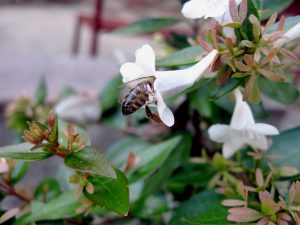
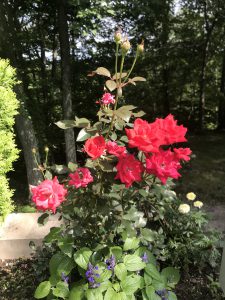
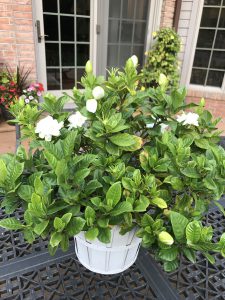
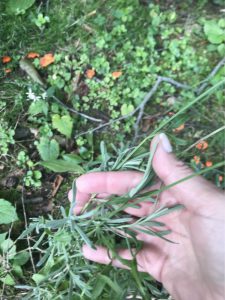
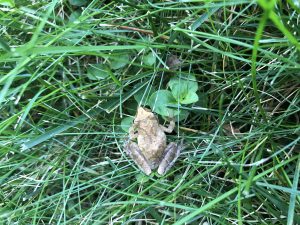



Hello Erica,
I enjoy reading your article. And now I know why the scent of certain flowers are different from time to time. I love basil too. I eat it fresh with my green salad or use it for cooking basil chicken. Delicious. Besides basil, I have the mint plant too.
A great refreshing article you wrote.
Sharon
Hi Sharon,
Basil chicken sounds yummy. It’s funny you should mention mint because I’m thinking of panting some next year. Not only does it smell amazing, the health benefits of mint leaves are unbelievable. Thanks for dropping by:)
Erica